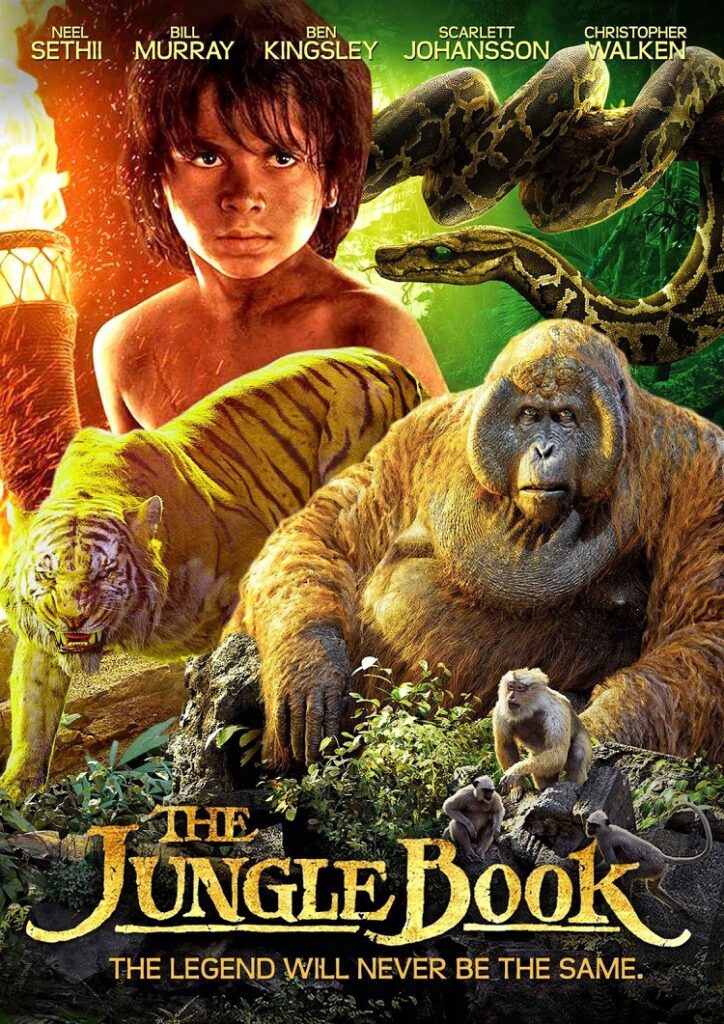
Written by Kristen Lopez
Almost fifty years have passed since The Jungle Book graced movies screen, marking the end of an era as the last film personally overseen by Walt Disney. Disney’s corporate jungle has changed a lot in 49 years but director Jon Favreau brings the magic back with his interpretation of Rudyard Kipling’s tale, engaging audiences in a lush world beautifully rendered in photo-realistic CGI while introducing old characters with added nuance and pathos. Favreau treads a new path by simply repainting and expanding the old one, creating a new tale Uncle Walt would be proud of.
Mowgli (newcomer Neel Sethi) has been raised by wolves since birth. When the villainous Bengal tiger, Shere Khan (voiced by Idris Elba) demands Mowgli be turned over to him it’s up to panther Bagheera (voiced by Ben Kingsley) to get Mowgli out of harm’s way by taking him to the “man village.”
First published in 1894, Rudyard Kipling’s jungle tales discussed the necessary preservation of the species and the increasing rise of Indian colonialism. Even in 1967 Disney’s tome tapped into the changing zeitgeist of rock n’ roll and the counterculture as “foreign” to Mowgli’s jungle world. Justin Marks’ screenplay takes the simpler, more Disney, narrative of appreciating an individual’s talents to make a better world.
Mowgli’s unique methods of getting water or human require human ingenuity, which the animals consider “tricks” and against the laws of nature within the jungle. It’s only once Mowgli appreciates his humanity and how being a man can allow him to aid his jungle friends, that everyone can unite and work together. In a landscape where people are hotly divided between party lines The Jungle Book reiterates that everyone needs to work together, using their individual thoughts and abilities, in order to benefit humanity as a whole.
Before he became the director of two Iron Man movies Jon Favreau started with two children’s based films – 2003’s Elf and 2005’s Zathura: A Space Adventure. (Zathura is an underrated gem, in my opinion.) This is easily Favreau’s best work since Elf and marks are great return to the director’s roots. Like Zathura, Favreau’s story follows a free-spirited character on an adventure far grander than he anticipated being hunted by a metaphorical Boogeyman (Shere Khan). Favreau pays loving tribute to Disney’s golden era, with references to the likes of Pinocchio and Maleficent – though those moments might have been present in the ’67 version time has brought an added awareness. There’s a respect for the source material as well as the studio who originally brought it to children, lovingly rendered in a closing book at the conclusion, a nod to how Disney original began and ended features. John Debney’s score continues this reverence by including pieces of the original ’67 score giving us music both nostalgic and present.
Take away the CGI and his set pieces fit the definition of thrilling, with the camera fluidly running and jumping alongside Mowgli. The audience, whether they know the story or not, are willing to be swept away on this adventure which ends up being tighter than the vignette style of the ’67 original. And one cannot ignore the jaw-dropping visual effects here. The uncanny valley is all but removed through the photo-realistic animals on display. Favreau played several characters himself to keep Sethi’s sightlines correct and it truly feels as if Mowgli is inhabiting the same world as the animals. All the animals blend well into the backgrounds which are bright and live up to the definition of lush. This is a world I only wish existed yet that comes off as grounded in some semblance of reality.
The hour and 45 minutes fly by as quickly as Mowgli climbing a tree, and it’s never feels like the audience is being short-changed. Though some characters, Kaa and King Louie, seem shoehorned into one scene for nostalgic purposes, Marks’ script gives additional motivation to Shere Khan – while still retaining his sociopathic mien – as well as integrates Mowgli’s wolf family (with parental units voiced by Giancarlo Esposito and Lupita Nyong’o) so that we end up caring about all the animals thoroughly.
The voice cast is also second to none filled with a litany of Oscar winners in the bunch. Unlike past Disney features this isn’t a case of “A-list actor first and character pairing second.” Each performer perfectly hones the character to their voice: Kingsley’s soft-spoken yet commanding as Bagheera, Scarlett Johansson is seductive as Kaa. The two outliers are the funnest voices, but do tend to pull you out of the film: Bill Murray as Baloo and Christopher Walken as King Louie. The roles are the showiest of both films, but it’s hard not seeing the actor first with the characters receding into the background. It is fun hearing both actors sing the respective songs from the film – “Bare Necessities” and “I Wanna Be Like You” – even if Walken’s rendition might remind you of Peter Pan. Newcomer Neel Sethi is a revelation, turning Mowgli away from the cocky young rascal of ’67 into an energetic little boy. Favreau covers the boy in scars and marks as battle scars of his time that another director would have ignored.
Jon Favreau brings The Jungle Book to a new generation with all the sumptuousness there is. This is nothing short of a beautiful dream world that I would be proud to see again and again.